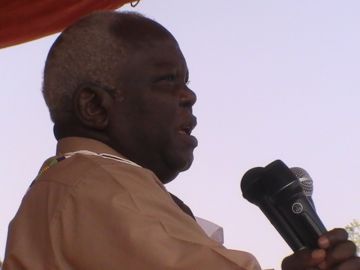South Sudan accuses Sudan of “deliberately” keeping troops in Abyei
August 25, 2012 (JUBA) – South Sudan on Saturday accused the government of neighbouring Sudan of “deliberately” keeping its troops in the contested area of Abyei, allegedly with intention to provoke return to war between the two sides..

Lino, who is the chairperson of the South Sudan’s ruling SPLM in Abyei, made the remark in an interview with South Sudan Television on Friday during which he argued that the international community had shown reluctance to pressure Khartoum to pull out its remaining troops in the area.
“Sudan had deliberately defied United Nations resolution 2046 and African Union roadmap. It is now keeping more than three companies north of Abyei which are fully equipped. They have heavy artilleries and other modern weapons including tanks inside territorial jurisdiction of Abyei area”, said Lino explaining that “such behaviour shows that the government of Sudan is not ready for peaceful settlement”.
Khartoum last week announced that the Sudanese presidency ordered a steering committee appointed last year to move to Abyei because Juba breached the 20 June agreement 2011 and appointed unilaterally a local administration there. Juba denied such allegations.
The two sides failed to implement a clause related to the formation of a temporary administration in last year deal because Juba refuses to give Khartoum the chairmanship of Abyei Legislative Assembly as it was agreed .
In return, Khartoum says the SPLM chaired administration cannot be established without the legislative council.
Sudan moved its troops from the area in accordance with the 2046 resolution of the UN Security Council as the Ethiopian troops control fully Abyei after the similar withdrawal of the South Sudanese forces.
However, Khartoum continues to maintain a small number of police forces in the Difra oil area, in northern Abyei arguing that the activities of rebel groups in South Kordofan justifies its presence there to protect oil facilities.
UN Assistant Secretary-General for Peacekeeping Edmond Mulet in a briefing to the Council on 29 June estimated that there were roughly between 100 to 130 lightly armed Sudanese police. “While these “oil police” do not have much force capacity, their presence is nonetheless a violation of resolution 2046, which demands that all Sudanese and South Sudanese security forces withdraw from the area,” he pointed out.
The council in a presidential statement later asked Khartoum to move this force out of the area.
Lino called on the Sudanese people and political forces there not to accept being fooled by the country’s ruling National Congress Party (NCP) to accept return to war.
“War is not in the interest of both countries. Sudanese people do not support war. People of South Sudan also do not have any interest in going back to war because it returns people to square one. We fought enough and we made peace, so why do we want to fight again,” he asked.
Abyei, an oil producing and fertile border region is claimed by both sides. It was due to vote on its future in January 2011 together with another referendum organised on the independence of southern Sudan.
However, the failure of the two parties to agree on who can take part in this crucial vote created tensions between the local components and the volatile situation there led some to term it as Sudan’s Kashmir.
The African Union mediation will organise a meeting between presidents Omer Al-Bashir and Salva Kiir to discuss mainly this issue. The mediation might submit a compromise over this issue of eligibility in order to pave the way for a referendum there.
The senior SPLM member said war was not the best option and that they would continue to push for peaceful settlement of the dispute.
“Our people of Abyei, despite all difficulties and atrocities committed in the area by the Sudanese government, still stand together with our leadership under comrade Salva Kiir Mayardit in seeking peaceful settlement,” he said.
“We have never changed this position. And we have always assured the people of Abyei who believe they are part of this nation to exercise courage and patience,” he underscored.
An international arbitration in July 2009, redrew the boundaries of Abyei region and confirmed the findings of an experts’ committee on the land ownership by nine chiefdom of Dinka Ngok. The court also redefined the borders and ceded oil fields located in the northern part of the area to Sudan.
(ST)
